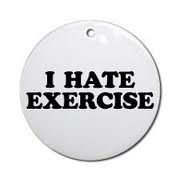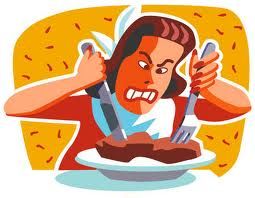Diet
The 10 Biggest Weight Loss Mistakes You Can Make
Habits of the highly unsuccessful
Posted July 16, 2012
I have counseled hundreds of people for weight loss, some have been successful and others have not. Here are 10 habits of people who were not successful. These habits appeared to be key factors in their failure.

1. NO EXERCISE — You can begin to lose weight through dieting (reducing your calories) alone, but the majority of people will not keep the weight off this way. People who dislike exercise are often the ones who attempt a diet only weight loss program. You will find that your weight will plateau early on because you can only reduce your calories so much. Dieting also lowers your metabolism, which makes every next pound harder to lose than the last. Exercise increases metabolism which will make continued weight loss and maintenance easier.
2. UNDERESTIMATE THE EFFORT — Unsuccessful losers often underestimate what it takes to lose weight. For example, someone might say, “I walked twice this week, but didn’t lose any weight!” Successful weight loss requires a keen awareness of how much effort is necessary to impact energy balance. In this case, burning 300 calories from walking is not sufficient to lose a pound, which is 3,500 calories. Consider what it takes to eliminate 3,500 calories for each pound and ask yourself how you can make a plan to do this.

3. WEIGHT LOSS TAKES THE BACKSEAT — I would love to play piano and speak Italian, however I admit that I have not put in what I know is the hard work necessary because I have prioritized other things above these wants. The end result is that I cannot do either. It takes more than wanting something to making it happen, it takes prioritizing. I often see people who are unsuccessful with weight loss constantly putting other life activities as higher priority than weight loss. Healthy behaviors take a backseat to almost anything else that comes up. “I was going to exercise, but I decided to help the neighbor with her garage sale instead.” People who are successful seem to have a “come hell or high water” attitude when it comes to healthy lifestyle—they do it daily no matter what.
4. TAKE IT PERSONALLY — Sally steps on the scale to see that she has gained 2 pounds. She is devastated. “I am hopeless! I have no self-control! I am so lazy too.” Sally is making a small weight gain into a deficit of personal character. Gaining weight is not a matter of your personal character, it is simply a matter of a mathematical equation gone off balance. Your task is to identify how that happened and how to fix it. Attributing your weight loss struggles to a personality insufficiency has a terrible impact on motivation and most often leads to failure.
5. DIAGNOSE SELF WITH RARE METABOLIC DISORDER. If a Volkswagon and a Ferrari leave Boston for NYC at 10am, which car will never get there? Huh? Of course both will get there, it’s just a matter of when. And who cares how fast, it is not a race! Some people assume that because their weight loss is slow that they must have a metabolic deficiency which makes them incapable of weight loss. Even if you are older, post-menopausal, and have a slow metabolism, you can still lose weight, it just goes slower. Never believe that you are physically incapable of losing weight though, because not only is it not true, but even just toying with the idea will undermine your motivation.

6. EAT FOR REVENGE – As Jane reaches for a cookie, her mother says, “You shouldn’t be eating cookies! You’ll gain more weight!” Jane gets so angry that she decides to eat 10 cookies to spite her mother. Jane, if you insist on spiting your mother, send her birthday card a day late, but please, please, do not eat 10 cookies! If you find that you let your weight become a way to get back at or spite other people, you will undermine your success. Ignore the naysayers, and remember, happiness is always the best revenge.
7. STRESS — People who are encased in an extremely stressful life that doesn’t allow much or any time for self-care are routinely unsuccessful at weight loss. For many people, losing weight is more about restructuring their life to allow them time to engage in healthy habits than it is about learning what to eat. If you are so overcommitted that you truly cannot find the time to exercise on most days of the week, you may be under too much stress. We only get one life. Make time to take care of yourself.
8. VASTLY UNDERESTIMATE INTAKE — We all underestimate our dietary intake, but the more accurate you can get, on both good days and bad, the more successful you will be. If you purposely skip a diet journal on a “bad” day you might be struggling with the ability to be fully aware and accepting of your habits. I challenge you to record your intake on a day you know will be bad (e.g., summer BBQ party) to practice tolerating the bad feelings that arise when you see that you’ve overeaten.
9. SKIPPING MEALS — Not eating for long periods of waking time is associated with eating more calories overall. People who skip meals perceive themselves as eating less because so much time goes by without eating. The truth is when we skip a meal, not only do we stockpile later but in the meantime our metabolism takes a hit. I suggest not going more than about 3 hours without eating something. This will regulate your appetite, blood sugar, and metabolism, all of which are essential to weight control.

10. EASILY LURED INTO FAD DIETS — Quick weight loss schemes are alluring but the truth is losing weight quickly is not good. Your body perceives rapid weight change as a signal of stress or disease. In response, corrective actions are made to conserve energy and increase appetite. If you were losing weight because of a terrible disease, this would be a good thing, but if you were intentionally trying to lose weight this means your body is now battling your efforts. By losing weight slowly (1-2 lbs a week) and exercising along the way, you avoid major metabolic slowdowns and will lose more weight, more easily. Slow and steady really does win the race.
What are the habits of successful people? Read the stories of Real Life Biggest Losers to find out!




